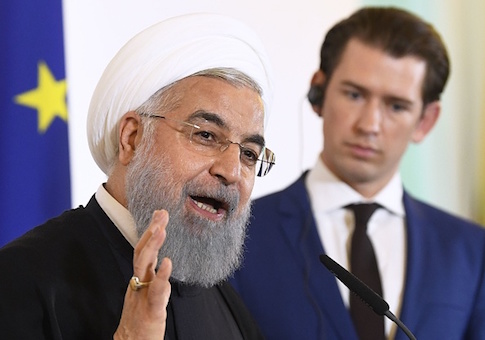Iranian leaders and their European counterparts are scrambling to save the landmark nuclear deal as the Islamic Republic's ruling regime teeters on the brink of collapse amid a severe financial crunch that has sparked popular protests across the country, according to multiple U.S. officials who told the Washington Free Beacon Europe is "poisoning" its relations with the Trump administration.
The European Union gifted Iran over the weekend a $21 million financial package aimed at keeping the hardline ruling regime afloat ahead of the reimposition of harsh U.S. sanctions that will choke off Tehran's access to international financial markets. U.S. officials described the aid package as foolish, saying it will fuel Iran's assassination attempts in European countries and its global terrorism operations.
Top Iranian leaders held a series of phone calls with their European counterparts over the weekend to plot avenues for skirting the new U.S. sanctions and keeping the nuclear agreement intact following President Donald Trump's decision to withdraw America from its commitments under the deal.
These efforts coincided with a new military agreement between Iran and Syria to keep the Islamic Republic's fighting forces in the country over the long-term.
U.S. officials in Congress and the Trump administration have been tracking the situation closely and say they will not permit Europe to avoid new U.S. sanctions, which could target any domestic and foreign entity that continues doing business with the Iranian regime.
Iranian President Hassan Rouhani worked on Monday to convince European nations to uphold the agreement and continue working with Tehran, lobbying that has paid off as countries such as France and Germany continue efforts to skirt the new U.S. sanctions and keep the Iranian regime financially buoyant.
In a call with French President Emanuel Macron on Monday, Rouhani urged European countries to more speedily work to uphold the nuclear deal and carve outs promoting increased business ties with Iran.
"Iran has acted upon all its undertakings based on the nuclear deal, and given the U.S. unilateral withdrawal from the agreement, it expects the other sides to implement their plans to maintain the agreement more rapidly and clearly," Rouhani was quoted as saying in the call, according to reports in Iran's state-controlled media.
Rouhani issued a veiled warning that if these countries fail to uphold the nuclear agreement, Iran will adopt other measures, though it remains unclear what options Iran has.
Iran's diplomacy has made inroads in Europe, forcing the United States to issue a stern warning over the weekend.
On the heels of the EU's $21 million aid package to Iran, top State Department official Brian Hook chastised these governments for using taxpayer money to keep the hardline regime afloat as its people protest for change.
The cash package "between Iran and Europe sends the wrong message at the wrong time. Foreign aid from European taxpayers perpetuates the regime's ability to neglect the needs of its people and stifles meaningful policy changes," Hook said in a statement. "More money in the hands of the Ayatollah means more money to conduct assassinations in those very European countries."
"The Iranian people face very real economic pressures caused by their government's corruption, mismanagement, and deep investment in terrorism and foreign conflicts," Hook said. "The United States and the European Union should be working together instead to find lasting solutions that truly support Iran's people and end the regime's threats to regional and global stability."
Congress also is keeping a close eye on the latest developments with senior officials telling the Free Beacon that continued European outreach to Iran is "poisoning" ties with the United States.
"A few months ago the Europeans could have gone either way, but now it's pretty clear they've made a deliberate decision to choose Iran over us just so they can make a few extra million dollars," said one senior congressional official, speaking only on background. "We're not going to tell any other country what to do, but it's poisoning their relationships on the Hill, and not just with Republicans."
Richard Goldberg, a senior adviser at the Foundation for Defense of Democracies who works on Iran sanctions issues, told the Free Beacon Iran is already feeling the weight of the new U.S. sanctions ahead of the Nov. 4 implementation date.
"The mullahs are starting to feel the pressure mounting as the fantasies of a global pushback on US sanctions start to fade," said Goldberg, a former senior Senate aide who helped craft original sanctions on Iran. "We should view this as a political warfare line of effort just as much as trying to survive economically. It should be a U.S. priority to delegitimize the regime on a daily basis and galvanize a coalition to condemn the regime's illicit activities."
